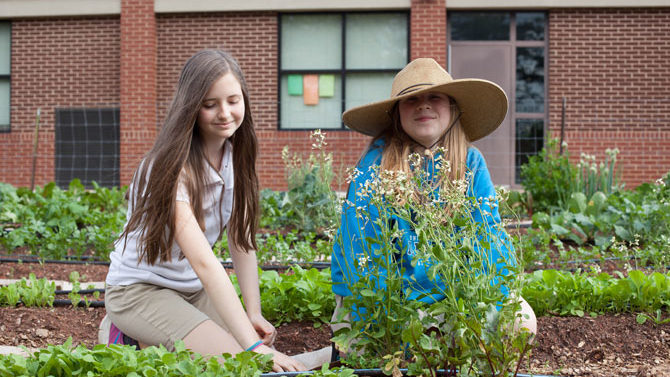Clarke County’s school nutritionist, Paula Farmer, traveled to the state Capitol earlier this month to collect a Golden Radish Award. The prestigious award recognizes outstanding leadership in the national Farm to School program, and Clarke County was one of 30 school districts in the state to receive it.
The farm-to-school movement began in the 1990s, as people across the country became increasingly interested in strengthening local economies through support of local farmers. As farmers markets proliferated and farm-to-table restaurants popped up, some parents looked for ways to bring fresh, local food to their kids’ cafeterias. In 2007, the National Farm to School Network formed, connecting schools interested in the idea with the resources to implement and improve their farm to school programs.
With many people in the community interested in the health of local children and the local economy, the farm-to-school effort in Athens began soon after the national network formed.
“In Clarke County, the farm-to-school program started about seven years ago as a result of local farmers, parents and other community stakeholders wanting to incorporate locally grown food in school meals,” Farmer says. “It has been a collaborative effort.”
The program has grown and improved every year since. It is also no longer limited to local food popping up on the lunch line; students have new opportunities to get involved with agriculture. All 21 schools in the Clarke County School District have edible gardens, which function as outdoor classrooms.
“Edible gardens are great ways to teach children about how food grows and make excellent learning labs,” Farmer says. “Our students are experiencing firsthand where foods come from and how to grow it. A school garden is a powerful environmental education tool.”
The farm-to-school program in the county has also helped teachers include nutrition and agriculture in the curriculum. Garden-based lessons are designed to meet the educational standards for the state of Georgia. This offers a creative alternative for teaching math, science and even some English lessons outside of the normal classroom paradigm.
Of the 30 Georgia school districts to receive a Golden Radish Award, Clarke County was one of only eight schools to be recognized at the Gold Level, the highest possible level of achievement. The Gold Level was achieved by the accomplishments in the past year, which include locally grown food items being featured in school meals 50 times, the growth of edible gardens and students participating in 35 taste tests of locally grown food like kale chips, broccoli, blueberries and carrots.
The farm-to-school program offers a wealth of advantages to participating students and farmers nationwide. In its annual report, the National Farm to School Network cited key outcomes, like students improving their eating habits. They consume more fruits and vegetables while in the cafeteria and at home, thanks both to having better food available to them and understanding the principals of nutrition. Students involved in these programs are also less likely to consume junk food and sugary soda.
Outside of the obvious nutritional benefits, farm-to-school involvement also helps students become more physically active; the demands of tending to a garden are a great source of exercise. The need to be in the elements while gardening also means that students spend less time in front of a computer screen. Adding agriculture to the curriculum has also proven to yield overall enhanced academic achievement, as well as improved behavior, social skills, life skills and self-image.
Farm-to-school programs are also good for the people serving the food. At schools involved in the program, cafeteria employees have experienced better motivation and overall morale. They gain the opportunity to learn about preparing local foods and eating seasonally. The cafeteria staff ultimately becomes a greater part of students’ education, as it gives them a chance to interact with teachers and students by communicating what is being served.
The programs have proven beneficial to farmers, with an average income increase of 5 percent for individual famers, and has brought new consumers to their products and diversified their market. Farmers reap the benefit of newfound awareness about local food, and the local economy becomes more active.
With all the positive outcomes that farm-to-school programming provides, the Clarke County School District is thriving as a leader in the state. “I am grateful that the-farm-to school initiative continues to expand in Clarke County,” says Farmer. “It is rewarding to know that our students are being offered the highest quality produce, and we are supporting children’s health and the local economy.”
Like what you just read? Support Flagpole by making a donation today. Every dollar you give helps fund our ongoing mission to provide Athens with quality, independent journalism.









